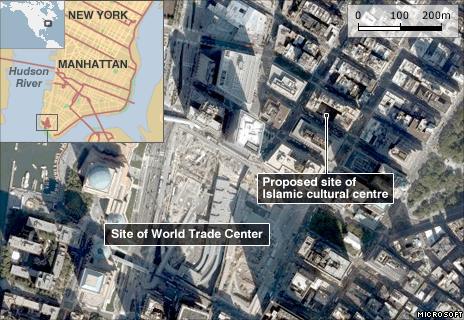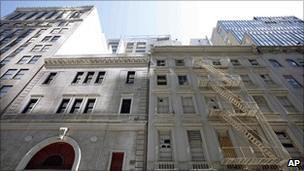Obama mosque comments reflect nuanced controversy
- Published
President Obama was speaking at a Muslim Iftar dinner at the White House
Was President Obama's support for the right to build the "Ground Zero mosque" in New York really out of step with America as his opponents would say - or a reflection of the ambiguity many of its citizens feel about this divisive, but nuanced issue?
When Mr Obama waded into the political debate over the proposed Islamic community centre and mosque in lower Manhattan on Friday, many Republican strategists rejoiced.
In the lead up to hotly contested congressional elections in November, the comments seemed like a gift - Mr Obama handing opponents ammunition with which to blast Democrats.
Democratic hopes in the mid-term elections are perhaps best served by keeping to local issues, diverting attention away from a bleak national economy, unpopular wars and a president with dragging approval ratings.
Yet the Ground Zero mosque debate transcends local politics. It's highly-charged, invoking emotional ideas of American identity and religious respect through the prism of the most defining and traumatizing incident in the nation's recent history.
For months it simmered on the edges of the national political scene, a tantalising wedge issue for conservatives even as key Democrats skirted the discussion.
But now, Mr Obama's comments have firmly transformed this local New York squabble into a billowing national debate.

He told guests at a Friday dinner honouring the Islamic holy month of Ramadan that America's commitment to religious freedom must be "unshakeable", and that Muslims in America had every right to practise their faith.
"That includes the right to build a place of worship and a community centre on private property in lower Manhattan, in accordance with local laws and ordinances," Mr Obama said.
The following day, Mr Obama clarified those comments, saying that his remarks referred only to the right of Muslims to build their centre, not the wisdom of choosing a site so close to Ground Zero.
To hear conservatives tell it, Mr Obama had just undermined the electoral chances of vulnerable Democrats, granting Republicans a legitimate way to push opponents to take a stand on this thorny and divisive issue.
But whether Mr Obama's comments are really out of step with views of the American public depends which poll you believe.
Rights v tastes
This poll, external from CNN suggests that they are: 68% of respondents state opposition to the Ground Zero mosque.
A Marist poll of voters, external in New York City found 53% opposed the mosque. Only 34% thought it would facilitate cultural understanding while half thought it was offensive.

The site of the planned Muslim cultural centre is a former department store
But neither poll questions voters on the direct substance of Mr Obama's remarks: the right of the Islamic community to build the mosque. That right is enshrined in the US constitution.
It's an important nuance in the debate, and one that simple "yes or no" polls often fail to capture. Americans can both support the right to build a mosque at the same time that they oppose the building of this particular mosque so close to a delicate site.
It's not necessarily inconsistent to be bothered by the presence of a mosque near the site of a devastating attack by jihadists, but to still defend the universal right of the faithful to practise their religion without restrictions or interference from the government.
A recent poll by Fox News, external draws out that distinction. It asked respondents first if they believed that the Ground Zero mosque was appropriate. An overwhelming 64% replied that it was not.
The follow-up question asked if the Muslim group had the right to build the mosque, to which a similarly large proportion - 61% - responded that yes, they do.
Clearly there is an overlap between Americans who support the right to build the mosque but maintain a belief that it's a poor decision to do so.
That's the same ground Mr Obama straddled with his comments last weekend.
But whether the public heard the nuance in the communicator-in-chief's remarks - or whether his comments will be lost in the frenzy of cable chatter over their supposed political toxicity - may not be clear until November.
- Published3 August 2010
- Published15 July 2010